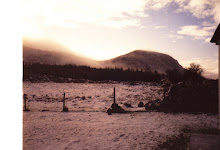via Atlas Film
By Daniel Greenwood
This review constains Idealism and spoilers.
During the final deluge of academic work belonging to my university degree, I bought two Mark Twain books. One was The Adventures of Huckleberry Finn, the classic novel, and the other was Roughing It, written by Twain as he travelled around the southern United States. In the final days of essay writing and editing, these two books gleamed from their spot underneath my desk, I couldn’t wait to read something non-theoretical again. Huck Finn was very good, I ate it up quickly, but Roughing It was more of a slog, and in the final stages of the book, with Twain’s rather dull account of molten lava, I couldn’t wait for it to finish. Into the Wild has spoken to me more closely than Roughing It could.
I have never felt such an urge to leave the city behind, to do as Henry David Thoreau did, or as experimental folk-singer Justin Vernon did to record his debut as Bon Iver, For Emma, Forever Ago. Thoreau is quoted by the protagonist of Into the Wild, Chris (Emile Hirsch), a 23-year-old post-grad (snap): ‘Rather than love, than money, than fame, give me truth.’ It’s a line from Walden that’s also emblazoned on the cover of the Penguin Great Ideas mini-volume Where I Lived and What I Lived For. Thoreau’s beautiful idea, which he managed to achieve and describe so well is a tragic tale here for young Chris. But that’s only really a footnote, because Into the Wild is an exceptionally-shot movie that charters a vast trek across a beautiful country. That it’s a true story is a fact unknown until the end, and that it’s directed by Sean Penn is another example of his thirst for ideas, for the stories of tragic individuals. It doesn’t match The Assassination of Richard Nixon (Niels Mueller, 2004) for pain-value or grit, but it’s Penn musing on death again. He’s interested, and so am I.
Chris is fed up with ‘things’, with the burden his parents’ troubled marriage hands down to him and his sister Carine (Jena Malone). Chris burns his cash, gives his 24,000 dollar college fund to Oxfam and embarks on a Quixotic journey across America. The opening scenes of Into the Wild are of Alaska, how Chris got here is recounted in stylishly edited sequences that make sure the narration is never boring. Carine narrates, never questioning her brother’s reasoning, only recounting the violent quarrels of her parents, underlining why Chris’s disappearance into the world is more desirable than being stuck at home.
Perhaps Chris is similar to Timothy Treadwell, better known as a man eaten by bears in Grizzly Man (Werner Herzog, 2005). To be ‘happy’, it’s a belief in yourself that you need, an inner calm which can transform the world around you. Chris oversteps this mark. The moment that he’s assaulted by a police office, or border patrol, as he sits happily on the empty carriage of a freight train the fun is over. This is the harbinger, the prophecy. If only Chris had gone on home.
The problem is that he loses sight of his goal, and the desire to live alone and off the land in Alaska is his downfall. What Chris strives for is greatness, the greatness he reads about in Tolstoy’s novels, in Thoreau. Personally, it’s Thoreau’s pal Ralph Waldo Emerson who stands over this film: ‘The secret of fortune is joy in our hands. Welcome evermore to gods and men is the self-helping man. For him all doors are flung wide; him all tongues greet, all honors crown, all eyes follow with desire. Our love goes out to him and embraces him because he did not need it. We solicitously and apologetically caress and celebrate him because he held on his way and scorned our disapprobation. The gods love him.’

No comments:
Post a Comment